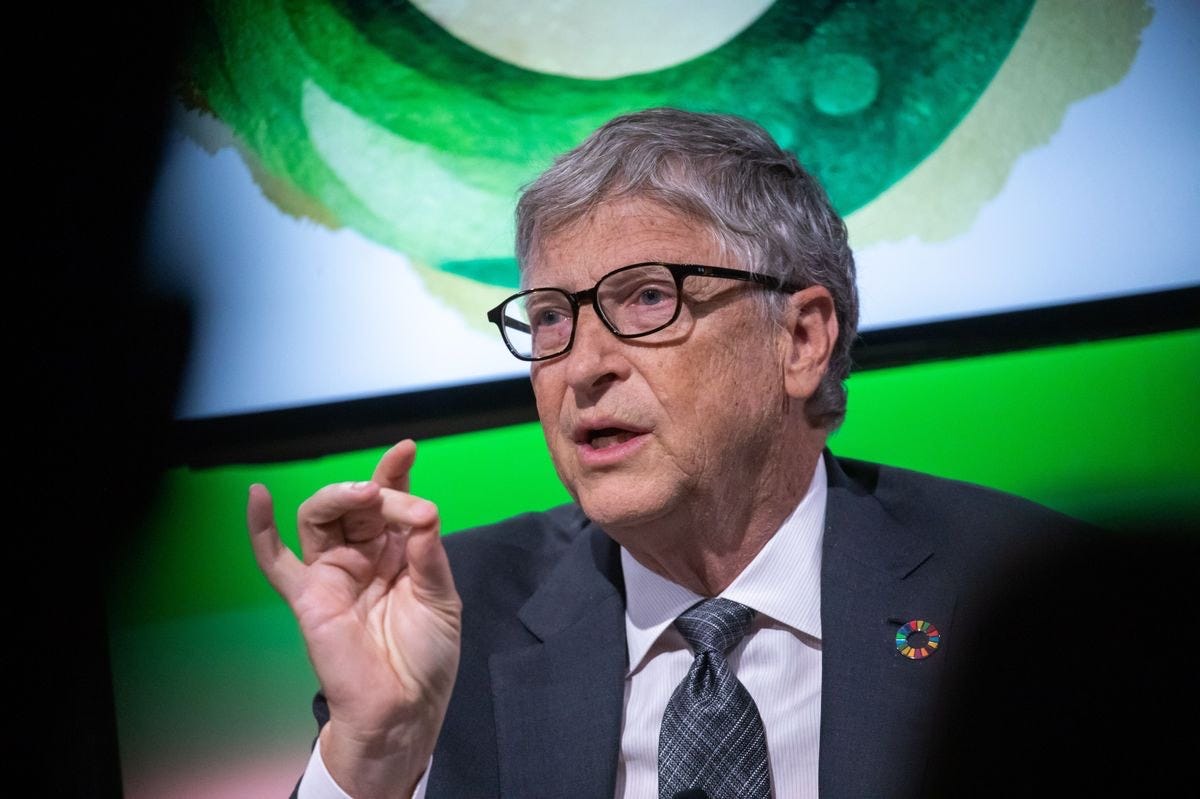Last September, Bill Gates hosted a large dinner at his house.
There were people from both Microsoft and OpenAI in attendance.
Sam Altman and Greg Brockman from OpenAI were there.
So was Microsoft CEO Satya Nadella.
Gates wanted a demo of what OpenAI had been working on.
The 67-year old visionary was known for being hard to impress, when it came to AI advancements.
But the demo turned out to be one of the most impactful in his career.
“It was stunning — it was mind-blowing,” Gates recalled on a recent podcast.
Gates believes we’ve entered an era, which is as significant as the early days of the Internet.
“Natural language is now the primary interface that we’re going to use to describe things — even to computers. So it’s a huge, huge advance.”
Back in the fold.
Microsoft made headlines this year, by unveiling a $10 billion investment in OpenAI.
It was the largest investment in company history.
Microsoft’s partnership with OpenAI dates back to 2016.
Given his interest in AI, Gates had been known to check in with the OpenAI team.
But he has not had an active, day-to-day role with Microsoft for years.
He stepped down as Microsoft CEO in the year 2000 and gave up his Chairman’s role in 2014.
And three years ago, he left the board entirely, to continue the philanthropic work that has dominated his schedule for more than two decades.
However, in recent months, he’s been deeply focused on Microsoft’s AI work.
“He has been working very closely with the teams,” Microsoft Chief Technology Officer Kevin Scott said on his own podcast this week. “He’s helping us think through what the amazing revolution we’re experiencing right now in AI means for OpenAI, Microsoft, all of our stakeholders and the world at large.”
Gates joined Scott on the podcast, “Behind The Tech,” to discuss some of the same views Gates also shared in his latest Gates Notes blog entitled, “The Age of AI has begun.”
“Ever since that day in September, I’ve said…wow, this is a fundamental change — a fundamental advance,” Gates said on the podcast.
“This is as big a breakthrough or milestone as I’ve seen in the whole digital computer realm, which really started when I was quite young.”
The biology test.
Last year, as OpenAI was developing its latest AI model, GPT-4, Gates gave the team a homework assignment.
“I said to them, hey, if you can pass an Advanced Placement Biology exam, where you take a question that is not part of the training set…and give fully reasoned answers…then you will really get my attention because that would be a heck of a milestone. So please work on that.”
He explained on the podcast he thought progress on scientific learning would take OpenAI a couple of years to advance.
But during the summer, OpenAI’s Altman and Brockman informed Gates they were ready for a demo.
So, in August, a dinner was set up for September.
In front of the roughly 30 guests in attendance, the chat bot largely passed Gates’ test.
“After the biology questions, I had them type in…what do you say to a father with a sick child. And it gave this very careful, excellent answer that is, perhaps, better than any of us in the room might have given. And so, it’s like…wow, what is the scope of this thing,” Gates recalled on the podcast.
“The rest of the night we asked it historical questions about things such as…are their criticisms about Churchill, or different things…and it was just fascinating.”
A similar experience to 1980.
As Gates outlines on the podcast and in his latest blog, the OpenAI dinner reminded him of a similarly mind-blowing demo in 1980.
Programmer Charles Simonyi, who was working at Xerox Parc, introduced him to a graphical user interface — as Gates describes it, “the forerunner of every modern operating system, including Windows.”
Gates ended up hiring Simonyi.
(Steve jobs had his own inspirational visit to Xerox Parc.)
Of course, there were growing pains in those early days for the PC.
And there have been some much publicized growing pains for ChatGPT too.
While skeptics emphasize those flaws, Gates is looking beyond any short term hiccups.
“These problems, I don’t think, are fundamental,” Gates said on the podcast.
Instead, he sees this as an opportunity to build off the foundation that created our digital world — the PC, the Internet, the software industry and the mobile phone.
“I do view this — the beginning of computers that read and write — as every bit as profound as any one of those steps.”

